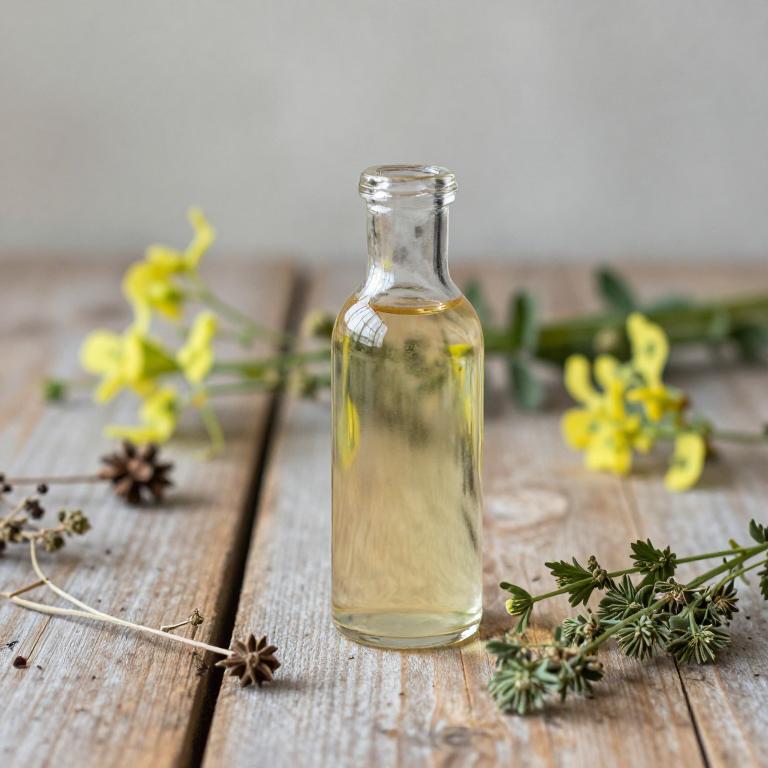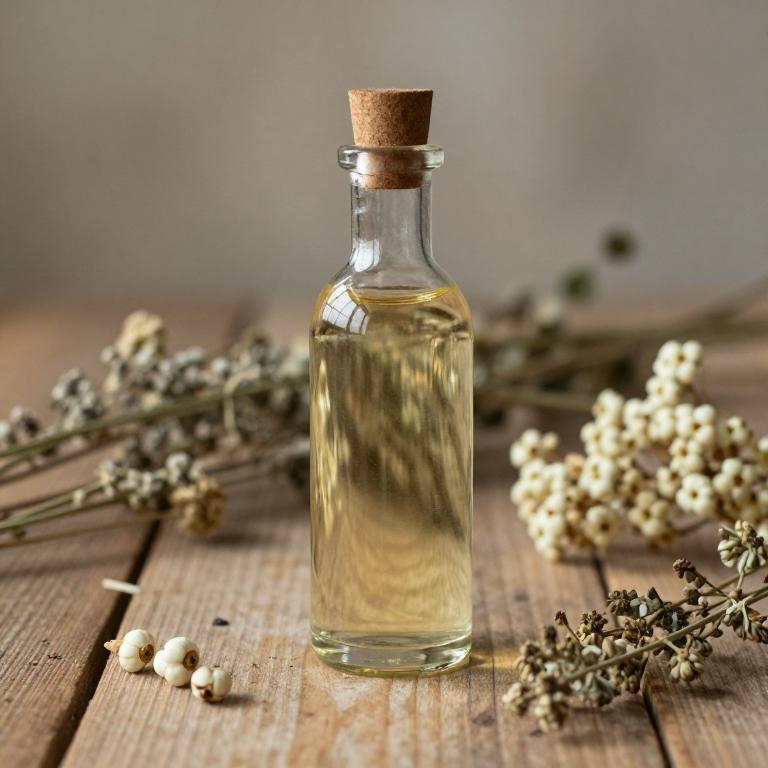10 Best Herbal Syrups For Fluid Retention

Herbal syrups have gained popularity as natural remedies for managing fluid retention, often attributed to their diuretic properties and anti-inflammatory compounds.
Ingredients such as dandelion, parsley, and ginger are commonly included for their ability to support kidney function and promote the elimination of excess fluids from the body. These syrups are typically made by steeping herbs in a sugar-water solution, resulting in a soothing and easily consumable form. While they may offer mild relief, they should not replace medical treatment for severe or persistent fluid retention.
It is important to consult a healthcare professional before using herbal syrups, especially for individuals with preexisting health conditions or those taking other medications.
Table of Contents
- 1. Thistle (Silybum marianum)
- 2. Stinging nettle (Urtica dioica)
- 3. Blessed thistle (Cnicus benedictus)
- 4. Chaste tree (Vitex agnus-castus)
- 5. Field horsetail (Equisetum arvense)
- 6. Dog rose (Rosa canina)
- 7. Licorice (Glycyrrhiza glabra)
- 8. Parsley (Petroselinum crispum)
- 9. Fennel (Foeniculum vulgare)
- 10. Valerian (Valeriana officinalis)
1. Thistle (Silybum marianum)

Silybum marianum, commonly known as milk thistle, is a herbal remedy often used in the form of syrup to support liver function and potentially reduce fluid retention.
The active compound, silymarin, is believed to have antioxidant and anti-inflammatory properties that may help improve circulation and reduce swelling in the body. While some studies suggest that milk thistle may aid in reducing fluid retention by supporting liver health, more research is needed to confirm its effectiveness in this context. Herbal syrups made from Silybum marianum are typically taken orally and may be combined with other herbs or nutrients to enhance their effects.
As with any herbal supplement, it is important to consult with a healthcare provider before use, especially for individuals with existing medical conditions or those taking medications.
2. Stinging nettle (Urtica dioica)

Urtica dioica, commonly known as stinging nettle, has been traditionally used in herbal medicine for its potential benefits in managing fluid retention.
When prepared as a syrup, urtica dioica may help reduce swelling and edema by promoting the elimination of excess fluids through diuretic properties. The active compounds in stinging nettle, such as potassium and flavonoids, are believed to support kidney function and balance fluid levels in the body. Herbal syrups made from urtica dioica are often recommended as a natural alternative to conventional diuretics, especially for individuals seeking gentler options.
However, it is important to consult with a healthcare professional before using urtica dioica syrup, especially for those with existing medical conditions or taking other medications.
3. Blessed thistle (Cnicus benedictus)

Cnicus benedictus, commonly known as blessed thorn, has been traditionally used in herbal medicine for its diuretic properties, making it a potential remedy for fluid retention.
The plant contains compounds such as flavonoids and tannins, which may help increase urine production and reduce swelling caused by excess fluid. Herbal syrups made from Cnicus benedictus are often prepared by combining the dried leaves and flowers with honey or other sweeteners to enhance palatability. These syrups are believed to support kidney function and aid in the elimination of excess water from the body.
However, individuals should consult with a healthcare professional before using Cnicus benedictus syrups, especially if they have underlying health conditions or are taking medications.
4. Chaste tree (Vitex agnus-castus)

Vitex agnus-castus, commonly known as chaste tree, has been traditionally used in herbal medicine to support hormonal balance and alleviate symptoms associated with fluid retention.
Herbal syrups made from Vitex agnus-castus are often formulated to promote lymphatic drainage and reduce water retention, particularly in women experiencing premenstrual syndrome or hormonal fluctuations. These syrups are typically taken in small doses and are believed to help regulate the body's fluid balance by supporting the proper function of the adrenal and pituitary glands. While scientific evidence is limited, many users report reduced bloating and improved overall well-being when using Vitex-based syrups regularly.
As with any herbal remedy, it is advisable to consult a healthcare professional before use, especially for individuals with existing medical conditions or those taking other medications.
5. Field horsetail (Equisetum arvense)

Equisetum arvense, commonly known as field horsetail, has been traditionally used in herbal medicine for its diuretic properties, which can help alleviate fluid retention.
The plant contains high levels of silica and other minerals that may support kidney function and promote the elimination of excess fluids from the body. Herbal syrups made from Equisetum arvense are often prepared by combining the dried plant material with honey or other natural sweeteners to enhance taste and bioavailability. These syrups are typically recommended for individuals experiencing mild edema or water retention due to hormonal imbalances, dietary factors, or lifestyle habits.
However, it is important to consult a healthcare professional before using Equisetum arvense, as it may interact with certain medications and is not suitable for everyone.
6. Dog rose (Rosa canina)

Rosa canina, commonly known as rosehip, is a traditional herbal remedy often used in the form of a syrup to support the body's natural processes, including the management of fluid retention.
The active compounds in rosehip, such as bioflavonoids and vitamin C, are believed to enhance the function of blood vessels and reduce inflammation, which can contribute to decreased fluid retention. Rosa canina syrup is typically taken as a dietary supplement, with recommended dosages varying depending on the individual's health needs and the product's formulation. It is often recommended for individuals experiencing mild swelling or edema, particularly those with conditions like lymphatic congestion or poor circulation.
While generally considered safe, it is important to consult a healthcare professional before starting any new herbal regimen, especially for those with existing medical conditions or taking other medications.
7. Licorice (Glycyrrhiza glabra)

Glycyrrhiza glabra, commonly known as licorice root, is often used in herbal syrups to address fluid retention due to its active compound, glycyrrhizin, which has mild diuretic properties.
These syrups can help reduce swelling and bloating by promoting the excretion of excess fluids from the body. However, prolonged use of licorice-based syrups may lead to side effects such as hypertension and electrolyte imbalances, as glycyrrhizin can increase sodium retention. It is important to consult a healthcare professional before using licorice syrups, especially for individuals with existing health conditions.
While licorice syrups may offer some relief for fluid retention, they should be used cautiously and in moderation.
8. Parsley (Petroselinum crispum)

Petroselinum crispum, commonly known as parsley, has been traditionally used in herbal medicine for its diuretic properties, which can help reduce fluid retention.
When prepared as a herbal syrup, parsley retains its beneficial compounds, such as apiol and myristicin, which support kidney function and promote the elimination of excess fluids from the body. This syrup is often recommended for individuals experiencing mild edema or bloating due to its natural ability to enhance urine production. The soothing taste of the syrup makes it a palatable alternative to synthetic diuretics, encouraging consistent use.
However, it is important to consult a healthcare professional before using parsley syrup, especially for those with existing medical conditions or on medication.
9. Fennel (Foeniculum vulgare)

Foeniculum vulgare, commonly known as fennel, has been traditionally used in herbal medicine for its potential benefits in reducing fluid retention.
Fennel herbal syrups are often prepared using the seeds of the plant, which contain compounds like anethole and fenchone that may support diuretic effects. These syrups are believed to help the body eliminate excess fluids by promoting urine production and improving kidney function. However, it is important to consult a healthcare professional before using fennel syrup, especially for individuals with existing medical conditions or those taking medications.
While some studies suggest fennel may have mild diuretic properties, more research is needed to fully understand its efficacy and safety in treating fluid retention.
10. Valerian (Valeriana officinalis)

Valeriana officinalis, commonly known as valerian, is traditionally used in herbal medicine for its calming effects, but it is also believed to support the body's natural processes in managing fluid retention.
While not a primary treatment for edema, valerian herbal syrups may help reduce water retention by promoting diuretic effects through its active compounds, such as valerenic acid. These syrups are often recommended as a natural alternative to synthetic diuretics, particularly for mild cases of fluid buildup. However, it is important to consult a healthcare professional before using valerian for fluid retention, as it may interact with certain medications or exacerbate existing conditions.
Overall, valerian officinalis herbal syrups can be a complementary approach to managing fluid retention when used under proper guidance.